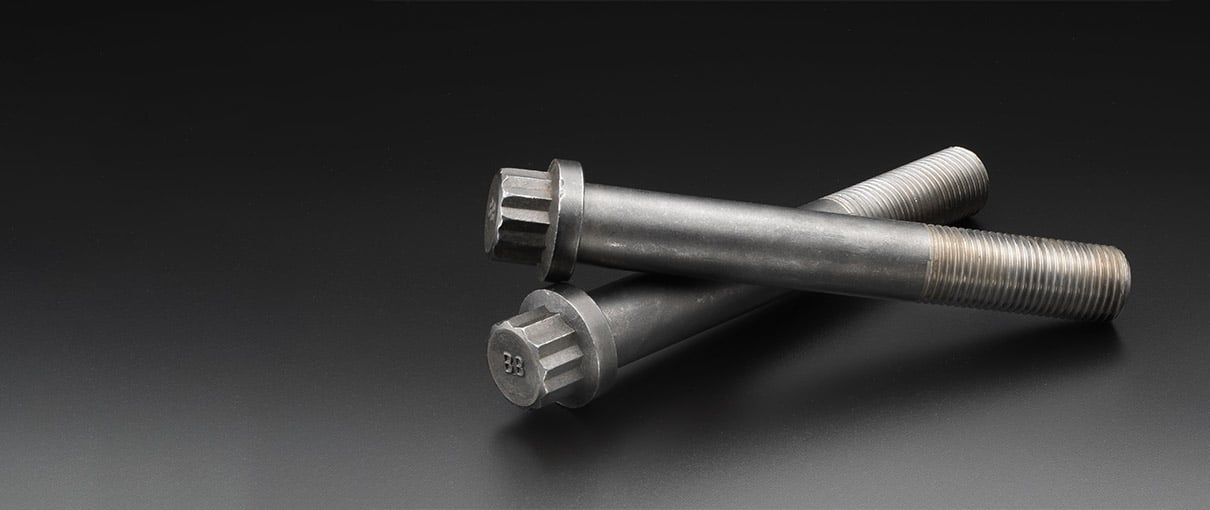Common Causes of Bolt Failure
An accident at one of the most popular amusement parks in the world is forcing many people in the fastener industry to take a long, hard...

12-point bolts are also known as 12-point flange bolts. They have a flange diameter and head thickness that are equivalent to a socket head cap screw. This means that they can be used as a replacement for any application that calls for a socket head cap screw.
The head of a 12-point bolt has twelve equally spaced points that form a star-like shape. The points allow the bolt to be tightened or loosened with a standard wrench from any angle. The flange of the bolt provides a larger bearing surface than a regular hex bolt, which helps distribute the clamping force more evenly.
There are several advantages of using 12-point bolts over other types of fasteners:
Higher torque capacity: The twelve points on the head provide more contact area between the wrench and the bolt than a hex socket cap screw. This allows the bolt to withstand higher torque without damaging the head or stripping the threads.
Better resistance to stripping the head: The star-like shape of the head prevents it from stripping when subjected to high torque or vibration. This reduces the risk of losing grip on the bolt or having it stuck in place.
Easier installation and removal: The twelve points on the head enable the bolt to be accessed from any angle with a standard wrench. This makes it easier to install and remove them in tight spaces or awkward positions1
For higher clamp load applications, such as in the oil and gas industry.
For tight spaces where a hex socket cap screw may not fit.
For mining, transportation, and agriculture equipment that require high strength and corrosion resistance.
For heavy duty stamping applications as well as earth-moving machinery, such as bulldozers and excavators.
Different grades of 12-point fasteners are available, each with varying levels of strength and durability. Grade 8 and 9 A574 are commonly used in automotive and aerospace applications, respectively, due to their high strength and resistance to corrosion. Grade 10.9 is a commonly used high-strength steel bolt that is used in construction, automotive, and industrial applications due to its strength and durability. It is often used in applications that require high clamp loads, such as engine components, transmissions, and suspension systems. Grade 12.9 is a high-strength alloy steel bolt that is used in applications that require the highest level of strength and durability, such as heavy equipment, aerospace, and military applications. It is often used in critical applications where failure is not an option. Choosing the appropriate grade of 12-point fastener is critical to ensure the safety and reliability of the equipment and systems in which they are used.
ISO (International Organization for Standardization) and DIN (Deutsches Institut für Normung or German Institute for Standardization) are two organizations that establish standards for industrial fasteners, including 12-point fasteners. Both standards provide guidelines for the dimensions, materials, and performance of fasteners to ensure their compatibility and interchangeability with other fasteners. However, there are some differences between the two standards.
One of the main differences between ISO and DIN standards for 12-point fasteners is their thread form. ISO standard fasteners have a metric thread form, while DIN standard fasteners have a metric or a unified thread form. Metric thread form fasteners are more common in Europe, while the unified thread form is more common in North America. Additionally, DIN standard fasteners typically have a higher strength rating compared to ISO standard fasteners. DIN standards also tend to be more detailed and include a wider range of sizes and materials compared to ISO standards.
When searching for a supplier of 12-point fasteners, it's important to consider factors such as experience, reputation, and product quality. A company with years of experience in the industry is likely to have the knowledge and expertise to provide high-quality fasteners that meet your specific needs. A company with a good reputation can offer peace of mind that the fasteners they supply are reliable and will perform as expected. Additionally, it's essential to consider the quality of the fasteners themselves. Look for a supplier that uses high-quality materials and manufacturing processes, and offers products that meet industry standards and regulations. Finally, consider customer service and support. Choose a supplier that is responsive to your inquiries and is able to offer assistance with any issues that may arise. By taking these factors into account when selecting a supplier, you can ensure that you receive high-quality 12-point fasteners that meet your requirements and are backed by reliable customer service and support.
With over 30 years of experience in the industry, Big Bolt offers a wide range of high-quality 12-point bolts in various grades, materials, and sizes to meet the specific needs of different applications.
An accident at one of the most popular amusement parks in the world is forcing many people in the fastener industry to take a long, hard...
A proper flange connection is not complete without a suitable bolt. Flange bolts come in different types and sizes, and selecting the most...
When it comes to oil and gas fasteners, there is nothing more important than adhering to industry standards. It is true for most commercial...
